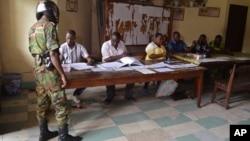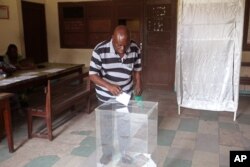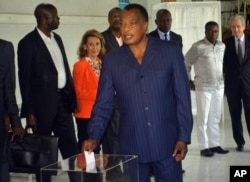Vote counting is underway in the Republic of Congo but information is scarce, as the government has blocked all phone and internet use in the country. President Denis Sassou Nguesso is widely expected to win another term in office.
The Republic of Congo held elections Sunday cut off from the world.
Hours before the vote, the government of the Central African nation called on phone and Internet carriers to shut down service for 48 hours.
Phone, Internet blackout
Amnesty International denounces the move.
“Shutting down communication networks is unjustified and it’s an attack on media freedom. Authorities must ensure that everyone is able to carry out its work without fear, without harassment,” said Illaria Allegrozzi.
Despite the ban, the coordinator for Congo's opposition coalition was able to send out tweets Monday, and retweeted video of people reading election results outside a polling station.
Online communications were blocked last year during protests against a constitutional referendum to change presidential age and term limits. That referendum, which passed with 92 percent of votes, allowed Denis Sassou Nguesso to run again after 32 years in power.
Alternative methods
Uganda employed a similar blackout strategy during polls last month – blocking social media platforms like Twitter and Facebook as votes were cast and tallied, though people used VPN access to get around the ban. Official results showed another of Africa’s longtime presidents, Yoweri Museveni, winning another term.
The Congo government says the current blackout is to prevent illegal announcement of election results.
The main opposition coalition had created its own structure to tally the votes, claiming that the official electoral commission was biased in favor of the president.
Reuters news agency reports that late Sunday, police fired tear gas at a couple hundred opposition supporters assembled outside a polling station in the capital. Amnesty’s Allegozzi warned that this type of response will only “inflame an already tense situation.”
“So the use of force must be avoided and any use of force should be impartially investigated,” she stated.
The African Union sent observers to Brazzaville for Sunday’s vote, but the European Union did not, saying the conditions for a free and fair election had not been met.







